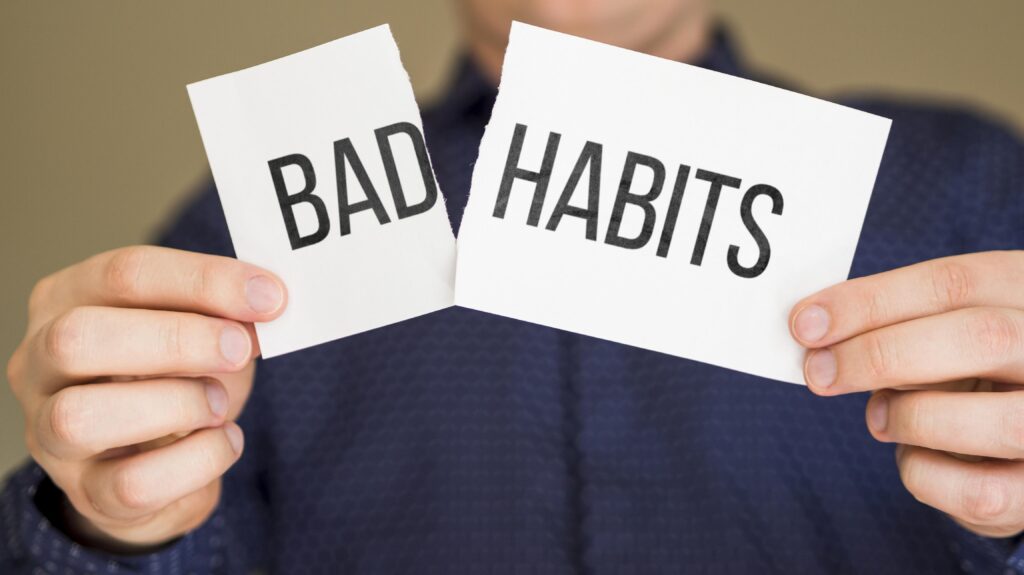6 Toxic Behaviors That Ruin Your Life

Not every behavior you do can be perfect all the time. Sometimes you do what feels right at the moment, and it turns out it was actually a bad decision. Sometimes your feelings get the best of you, and you act according to the emotion you feel.
But some of those behaviors can develop into a habit, and not a healthy one. What’s interesting about these behaviors is that you probably know they are bad, but you might not realize exactly how bad they can get. If left unchanged, some toxic behaviors can seriously sabotage your success and may even ruin your life in the long run.
Here are some of these behaviors:
1. Assuming the worst
When you’re not really sure about a certain situation, like, for example, a strangers’ intentions or a loved one’s feelings, your brain wants to do anything in its power to fill in the blanks. That’s when you make your own interpretation about the situation – assumptions. And often, those interpretations are negative, for example “This person looked at me funny, they must think I’m weird” or “she took 2 hours to answer my text, I guess she doesn’t like me anymore”.
We unconsciously make assumptions and judgments about: other people’s behavior, other people’s intentions behind their behavior, and our own behavior and intentions. But no matter how easy it is to always assume the negative, jumping to negative conclusions can negatively affect your daily life and maybe even damage your relationships.
There are several reasons why assuming is so bad for you:
- they’re an easy way out – they stop you for trying harder and make you just give up,
- they keep you stuck in the past – if you had bad experiences in the past, you might assume situations in the future will be the same,
- they foster a negative mindset – constantly thinking the worst will make your brain get “stuck” in that negativity,
- it’s toxic behavior – by making assumptions about someone, you could hurt their feelings if it turns out you were wrong,
- it becomes a bad habit – everytime you make an assumption, it gets easier and easier to continue, and harder to stop.
2. Gossiping
Sometimes, juicy gossip is just too hard to resist. Talking about others is in our human nature, and everyone has done it at least once in their life. Just simply talking about somebody may not be that bad, but gossiping usually includes more than that. When you gossip, you spread (often) false information about someone and you focus on their bad sides.
This toxic habit can not only negatively impact you, but also the ones you gossip about. If others notice you gossip too much, they might not wanna hang out with you, which leads to social isolation. Also, they might be afraid to trust you or tell you their secrets. On top of that, you could seriously hurt the person you gossip about, and you surely don’t want that weight on your back.
3. Procrastinating
How often do you say “I’ll do it tomorrow”? Do you really do it tomorrow? Or do you say “okay now I’ll really do it tomorrow”?
We’re all guilty of postponing our responsibilities sometimes, so it’s okay if this happens to you from time to time. But sometimes “from time to time” means… almost everyday. You just keep procrastinating and leaving your work for the last minute. Or, if there’s no deadline, you might not do it at all! It may seem logical why this behavior would be toxic for your quality of life, but here are some reasons to explain it further:
- It affects academic performance. You could procrastinate doing your assignments, homework, exam prep… And not doing this work can lead to poor academic performance – bad grades, losing points, or even failing your exams.
- It promotes negative feelings and lowers self-compassion. If you procrastinate a lot, you might feel bad about yourself, you could find it harder to forgive yourself when something doesn’t end up right, or you may think your failure is a result of your lack of competence, rather than procrastination.
- It adds to the workload. Since you don’t get things done when you’re supposed to, all of the other tasks and responsibilities keep piling up and you might start feeling overwhelmed by everything.
- It can affect your mental and physical health. Not getting things done might make you feel afraid of the consequences, which can in turn cause feelings of anxiety. Also, since you feel stressed all the time, stress can make your cortisol levels (a stress hormone) rise, which can leave negative impacts on your body (heart, blood pressure, hormonal levels…).
4. Overspending on unnecessary things
Do you often find yourself spending too much money on different stuff? How important is all that stuff really?
Buying stuff can sometimes feel very rewarding. Of course, it’s totally okay to buy something for yourself every now and then. But the problem arises when your closet gets full of clothes you don’t wear, bookshelves full of books you don’t read and rooms full of decor that just collects dust, all while your wallet gets thinner. Compulsive buying can make you feel embarrassed of spending so much money, anxious about not having enough saved up, and it can leave you in debt or totally losing control over your money. And maybe the scariest thing about it is – it can become an addiction, since it activates reward centers in your brain, the same ones that light up during drug addiction.
5. Spending too much time on social media
Have you ever checked the app usage on your phone to see how much time you spend on social media? If yes, were you surprised to see those numbers?
Sometimes when you scroll through Instagram or watch Tik To videos, you lose track of time, and don’t even notice it’s been hours of endless scrolling. But, no matter how interesting the content on social media can be, spending a lot of time on the Internet is actually pretty unhealthy.
When you spend hours online, even if you have no deadlines or important responsibilities at that moment, it takes away your valuable time that you could be spending on hobbies, friends or family, developing a new skill… Also, your mental health could suffer greatly. Since you see so many cool people’s posts, you might feel like they’re better than you, which can increase feelings of inadequacy, envy and dissatisfaction. It can also make you feel lonely, which was confirmed by a study published in a Journal of Social & Clinical Psychology. Lastly, your physical health can suffer too – you might have problems with your sleep and eyesight.
6. Not drinking enough water
Did it ever happen to you to go about your day until late afternoon, and you suddenly get thirsty and realize “wow, I barely drank any water today!”?
It may seem weird that you can forget to drink, but it happens, and it is not uncommon. But even if it happens to the best of us, it really shouldn’t happen – it shows lack of self care, and the consequences of not consuming enough water can be extremely dangerous for your health.
Low levels of water in your body can make you feel low on energy and moody, and it can cause mental fog – making you drowsy and forgetful. Also, it can make your metabolism slow down and give you some pretty painful headaches. Your skin suffers as well, not drinking enough water can increase the effects of aging and make your skin look drier, flakier, wrinklier. And finally, as shown in a study in BMC Cardiovascular Disorders, not drinking enough water and being dehydrated can raise the risk of strokes. So, remember to take a sip whenever you can!
Closing thoughts
Hopefully this article helped you realize why some of these things we often do can be toxic for your well-being. Even though it’s not easy to change a behavior that you’ve been doing for a long time, with enough effort and willingness to change, you can overcome this and develop new, healthy habits.
Thank you for reading!
Written by: Stela Košić
References:
- Baum, I. (2020, July 14). 10 Dangerous Side Effects of Not Drinking Enough Water. EatingWell. https://www.eatingwell.com/article/292133/10-dangerous-side-effects-of-not-drinking-enough-water/
- Blick, S. (2019, November 17). 9 Reasons Why Making Assumptions is Dangerous – Thrive Global. Medium. https://medium.com/thrive-global/9-reasons-why-making-assumptions-is-dangerous-345e8b24008c
- E. (2020, December 10). 7 Bad Effects of Gossip. Amerikanki.Com. https://en.amerikanki.com/bad-effects-gossip/amp-list/
- Hunt, M. G., Marx, R., Lipson, C., & Young, J. (2018). No More FOMO: Limiting Social Media Decreases Loneliness and Depression. Journal of Social and Clinical Psychology, 37(10), 751–768. https://doi.org/10.1521/jscp.2018.37.10.751
- Kane, S. (2018, March 18). 10 Good and 10 Bad Things About Procrastination. Psych Central. https://psychcentral.com/lib/10-good-and-10-bad-things-about-procrastination#10
- Sherrell, Z. M. (2021, September 15). What to know about social media and mental health. Medical News Today. https://www.medicalnewstoday.com/articles/social-media-and-mental-health#statistics
- Young, J. L. (2016, October 9). Compulsive Spending: What You Need to Know. Psychology Today. https://www.psychologytoday.com/intl/blog/when-your-adult-child-breaks-your-heart/201612/compulsive-spending-what-you-need-know
- Zimberoff, D. (2014, February 24). Assumptions and How They Negatively Affect our Relationships. Wellness Institute. https://web.wellness-institute.org/blog/bid/375281/assumptions-and-how-they-negatively-affect-our-relationships




Responses